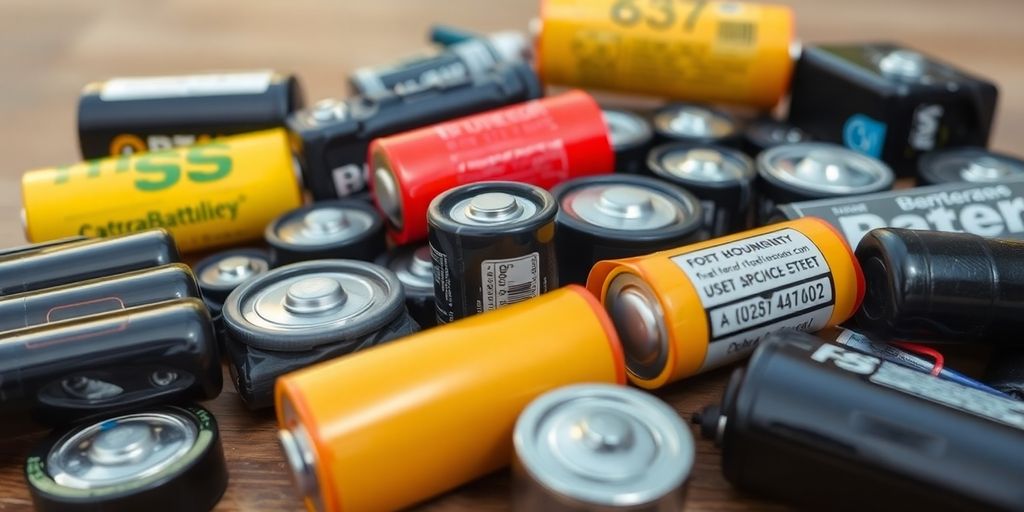Batteries are everywhere in our lives, powering everything from remote controls to toys. But when they run out, it’s important to dispose of them properly. Throwing batteries in the trash can harm the environment and our health. This guide will help you understand why recycling batteries is crucial and how to do it right in your local area.
- Where Can I Buy Cigarettes Near Me: Your Ultimate Guide to Local Tobacco Shops
- Discover Unique Treasures at the Best Souvenir Shop Near Me
- Discover the Best Nature Places Near Me: Your Ultimate Guide to Local Natural Wonders
- Finding Online Doctors Who Prescribe Phentermine Near Me: Your Ultimate Guide
- Discovering the Best Breakfast Places Near Me in San Jose: A 2024 Guide
Key Takeaways
- Recycling batteries prevents harmful chemicals from polluting the environment.
- There are different recycling methods for various battery types.
- Local recycling programs make it easy to dispose of batteries safely.
- Always prepare batteries for recycling by storing them correctly.
- Using reliable recycling services supports the local economy and sustainability.
Understanding the Importance of Battery Recycling
Environmental Impact of Improper Disposal
Improperly disposing of batteries can lead to serious environmental harm. When batteries end up in landfills, they can leak toxic substances into the soil and water. This contamination can affect wildlife and even human health. Here are some key points to consider:
- Batteries contain harmful chemicals like lead and cadmium.
- These substances can seep into groundwater, affecting drinking water.
- Protecting our environment starts with responsible disposal.
Health Risks Associated with Battery Waste
The health risks from battery waste are significant. Toxic materials in batteries can cause various health issues. Here are some risks:
- Skin irritation from direct contact with battery acid.
- Respiratory problems from inhaling fumes.
- Long-term exposure can lead to serious illnesses.
Economic Benefits of Recycling Batteries
Recycling batteries is not just good for the environment; it also has economic advantages. Recycling saves money and resources. Here’s how:
- Reduces the need for new materials, saving on mining costs.
- Creates jobs in the recycling industry.
- Helps local economies by supporting recycling programs.
Recycling batteries is a simple yet effective way to protect our planet and health. By participating in recycling programs, we contribute to a cleaner, safer environment for everyone.
In summary, understanding the importance of battery recycling is crucial for protecting our environment, health, and economy. By making informed choices, we can all play a part in this vital process.
Types of Batteries and Their Disposal Methods
Batteries come in various types, and each has its own way of being disposed of properly. Understanding these differences is crucial for effective recycling. Improper disposal can harm the environment. Here’s a breakdown of the main types of batteries and how to recycle them:
Single-Use Batteries
Single-use batteries, like AA and AAA, are commonly found in household items such as remote controls and toys. Here are some options for recycling them:
- Local Collection: Check with your city or waste management service for collection events.
- Retail Drop-Off: Some stores, like hardware shops, accept these batteries for recycling.
- Mail-In Services: Companies like Call2Recycle offer mail-in options for a fee.
Rechargeable Batteries
Rechargeable batteries are used in devices like phones and laptops. They can be recycled through:
- Specialized Centers: Look for certified e-waste recyclers in your area.
- Retail Programs: Many electronics stores have take-back programs for these batteries.
- Community Events: Participate in local recycling events that accept rechargeable batteries.
Automotive Batteries
Automotive batteries are used in cars and are more complex to recycle. Here’s how to handle them:
- Professional Services: Always consult a specialized recycling service for automotive batteries.
- Return to Retailers: Many auto parts stores will take back old batteries.
- Local Regulations: Be aware that in most states, it is illegal to dispose of used lead-acid batteries in landfills. Disposal of these batteries to a landfill is harmful as they may corrode and release lead.
| Battery Type | Recycling Method | Notes |
|---|---|---|
| Single-Use | Local collection, retail drop-off | Check for free options |
| Rechargeable | Specialized centers, retail programs | Often accepted at electronics stores |
| Automotive | Professional services, return to retailers | Must be handled carefully |


Proper disposal of batteries is essential to protect our environment and health. Always choose recycling options to keep harmful materials out of landfills.
Local Recycling Programs and Drop-Off Points
Read More : Discover the Best Veg Cafes Near Me: A Guide to Vegetarian Delights in Your Area
When it comes to recycling batteries, there are several local options available to you. These programs make it easy to dispose of batteries safely and responsibly.
Municipal Collection Events
- Many cities hold special events where residents can drop off their used batteries.
- These events are often advertised through local community boards or websites.
- Check with your city’s waste management department for upcoming dates.
Retailer Take-Back Programs
- Most electronic retailers offer in-store battery recycling programs. This includes big-box stores and battery specialty shops.
- Simply bring your used batteries to the store, and they will handle the recycling for you.
- Some retailers may even offer incentives, like discounts on future purchases.
Specialized Recycling Centers
- Look for local recycling centers that focus specifically on hazardous waste, including batteries.
- These centers are equipped to handle various types of batteries safely.
- You can often find a list of these centers on your state’s environmental agency website.
Remember, recycling batteries not only helps the environment but also keeps harmful materials out of landfills. By using local recycling services, you contribute to a cleaner community.
| Type of Program | Description | Contact Information |
|---|---|---|
| Municipal Collection Events | Scheduled events for battery drop-off | Call your local waste department |
| Retailer Take-Back Programs | In-store recycling at electronic retailers | Check with local stores |
| Specialized Recycling Centers | Facilities dedicated to hazardous waste recycling | Visit state environmental agency |
Preparing Your Batteries for Recycling
Safe Storage Tips
To ensure safe recycling, store your batteries properly. Here are some tips:
- Keep batteries in a cool, dry place.
- Avoid stacking batteries on top of each other to prevent contact.
- Use tape to cover the terminals of batteries to prevent sparks.
Handling Leaked Batteries
If you find a battery that has leaked:
- Wear gloves to protect your hands.
- Place the battery in a plastic bag.
- Check with your recycling center for specific disposal instructions.
Packaging for Transport
When you’re ready to recycle:
- Use a sturdy container to hold the batteries.
- Make sure the container is labeled as containing batteries.
- Avoid mixing different types of batteries in the same container.
Proper preparation is key to ensuring that your batteries are recycled safely and effectively. Taking these steps can prevent accidents and protect the environment.
Mail-In Recycling Options
If you can’t make it to a drop-off site, mail-in recycling is a great choice. This option allows you to recycle batteries from home. Here’s how it works:
How Mail-In Programs Work
- Purchase a recycling kit online.
- Fill it with your used batteries.
- Send it back using the prepaid shipping label included.
This method is perfect for those who want to recycle without leaving their house.
Popular Mail-In Services
Many companies offer mail-in recycling services. Here are a few:
- Recycle Technologies: They provide all-in-one kits for easy recycling.
- Call2Recycle: A well-known service for battery recycling.
- Staples: They accept a wide range of electronic items, including batteries.
Cost and Convenience
Mail-in recycling is often affordable and convenient. You can recycle at your own pace, and it helps keep harmful materials out of landfills.
Recycling batteries is essential for protecting our environment and conserving resources. By choosing mail-in options, you contribute to a cleaner planet.
In summary, mail-in recycling is a simple and effective way to dispose of batteries responsibly. It’s a great option for those who may not have easy access to local drop-off points.
Choosing a Reliable Recycling Service
When it comes to recycling batteries, finding a trustworthy service is crucial. Here are some key points to consider:
Researching Local Services
- Start by searching for "battery recycling near me" to find local options.
- Look for companies with a good reputation in your area.
- Check if they have experience in handling different types of batteries.
Certifications to Look For
- Ensure the recycling service has proper certifications.
- Certifications indicate compliance with local and federal regulations.
- This helps you avoid penalties and ensures safe recycling practices.
Customer Reviews and Testimonials
- Read online reviews to gauge the quality of service.
- Look for testimonials from previous clients to understand their experiences.
- Positive feedback can be a good indicator of reliability.
Choosing the right battery recycling service not only helps the environment but also supports your local community.
Read More : Discover the Best South Indian Restaurants Near Me for Authentic Flavors
By following these steps, you can confidently select a reliable battery recycling service that meets your needs and contributes to a healthier planet.
Benefits of Using Local Recycling Services
Recycling batteries locally offers several advantages that can positively impact both the environment and the community.
Accessibility and Convenience
- Easier Transport: Choosing a nearby recycling service makes it simpler to drop off your used batteries.
- Quick Access: Local services often have multiple drop-off points, reducing travel time.
- Community Support: By using local services, you help strengthen your community’s economy.
Supporting Local Economy
- Job Creation: Local recycling services create jobs in your area, contributing to economic growth.
- Investment in Community: Money spent on local services stays within the community, fostering development.
- Partnerships: Local businesses often collaborate with schools and organizations to promote recycling.
Reducing Carbon Footprint
- Lower Emissions: Transporting batteries shorter distances reduces greenhouse gas emissions.
- Resource Recovery: Local recycling helps recover valuable materials, minimizing the need for new mining operations. By recycling lithium-ion batteries, we recover valuable materials like cobalt, nickel, and lithium.
- Environmental Protection: Proper disposal prevents toxic chemicals from harming local ecosystems.
Using local recycling services not only benefits the environment but also strengthens community ties and promotes sustainability.
In summary, utilizing local battery recycling services is a win-win situation for both the environment and your community. It’s a simple way to make a big difference!
Final Thoughts on Battery Recycling
In conclusion, recycling batteries is not just a good idea; it’s essential for protecting our planet. By finding local recycling options, you can help keep harmful materials out of landfills and ensure valuable resources are reused. Remember to check your local recycling centers or use online tools to find the best places to drop off your used batteries. Every small action counts, and together, we can make a big difference for our environment.
Frequently Asked Questions
What should I do with used batteries?
You should recycle used batteries instead of throwing them in the trash. Look for local recycling centers or special collection events.
Can I recycle batteries in my regular recycling bin?
No, most recycling programs do not accept batteries in curbside bins. Check local guidelines for proper disposal.
Are there any risks in handling old batteries?
Yes, old batteries can leak harmful chemicals. Always handle them carefully and store them safely.
Where can I find a battery recycling location near me?
You can use online recycling locators or check with your local waste management for nearby recycling options.
How do I prepare batteries for recycling?
Make sure to store them in a safe container, keep terminals from touching, and avoid storing them in extreme temperatures.
What types of batteries can I recycle?
You can recycle single-use batteries, rechargeable batteries, and automotive batteries, but check local rules for specifics.
Soure: https://herego.net
Category: near me


